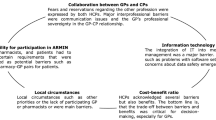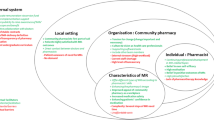Abstract
Objective To explore pharmacists’ views on managing patients with chronic illness; to understand the incentives and barriers they perceive and the solutions they propose to overcome these barriers. Setting Hospital pharmacists, with experience in managing people with chronic illnesses, working in western Sydney, Australia, were interviewed during June and July 2008. Method A qualitative study involving group and individual interviews using a semi-structured interview guide. Results Hospital pharmacists identified lack of communication between different healthcare providers and with patients as a contributing factor to lack of continuity of care and this was perceived as a major barrier in managing patients with chronic illnesses. Pharmacists were also concerned about the effects of medication costs, and poor patient knowledge regarding their disease and medications, and the effects on adherence. Suggested solutions included taking a teamwork approach in the management of chronic illness and providing more information to patients to improve adherence. Conclusion The identified incentives and barriers have provided valuable information on what pharmacists face in managing patients with chronic illness. Most of the solutions suggested by them have been tested and proven unsuccessful. Develop successful health policy to address the identified barriers remains a challenge.
Similar content being viewed by others
References
National Health Priority Action Council (NHPAC). National chronic disease strategy. Canberra: Australian Government Department of Health and Ageing; 2006.
Hall JP, Viney RC. National health reform needs strategic investment in health services research. Med J Aust. 2008;188:33–5.
Pinto SL, Lively BT, Siganga W, Holiday-Goodman M, Kamm G. Using the health belief model to test factors affecting patient retention in diabetes-related pharmaceutical care services. Res Social Adm Pharm. 2006;2:38–58.
Cerulli J, Malone M. Women’s health promotion within a community advanced pharmacy practice experience. Am J Pharm Educ. 2008;72:25–31.
Clark AM, McMurray JJ, Morrison CE, Murdoch DL, Capewell S, Reid ME. A qualitative study of the contribution of pharmacists to heart failure management in Scotland. Pharm World Sci. 2005;27:453–8.
Anderson C, Blenkinsopp A, Armstrong M. Feedback from community pharmacy users on the contribution of community pharmacy to improving the public’s health: a systematic review of the peer reviewed and non-peer reviewed literature 1990–2002. Health Expect. 2004;7:191–202.
Schapansky LM, Johnson JA. Pharmacists’ attitudes toward diabetes. J Am Pharm Assoc (Wash). 2000;40:371–7.
The Pharmacy Guild of Australia. Professional Pharmacy Services: The Dose Administration Aids program. http://www.Guild.Org.Au/pps/content.Asp?Id=1888. Accessed 17 March 2010.
Medicare Australia. Home medicines review (HMR). Canberra: Australian Government. 2009. http://www.Medicareaustralia.Gov.Au/provider/pbs/fourth-agreement/hmr.Jsp. Accessed 17 Nov 2009.
The Pharmacy Guild of Australia. Home medicines review information. http://www.Guild.Org.Au/mmr/content.Asp?Id=421. Accessed 17 Nov 2009.
Roughead E, Pratt N, Peck R, Gilbert A. Improving medication safety: influence of a patient-specific prescriber feedback program on rate of medication reviews performed by Australian general medical practitioners. Pharmacoepidemiol Drug Saf. 2007;16:797–803.
Jeon Y-H, Glasgow N, Usherwood T, Essue B, Pearce-Brown C, Jowsey T, et al. The experience of chronic illness: balancing life and illness. Presented at the GP & PHC Research Conference. Hobart, Australia 2008.
Yen L, Gillespie J, Jeon Y-H, Brien JE, Jan S, Klakovic M, et al. Health professional, patients and chronic illness policy: a qualitative study. Health Expect (in press).
Lehnbom EC, Boxall AM, Russell LM, Brien JE. Management of medicines in chronic illness: views of community pharmacists in New South Wales. J Pharm Pract Res. 2009;39:207–10.
Fontana A, Frey JH. Interviewing: the art of science. In: Denzin NK, Lincoln YS, editors. Handbook of qualitative research. Thousand Oaks: SAGE Publications; 1994. p. 361–76. ISBN 0-8039-4679-1.
Corbin JM, Strauss A. Basics of qualitative research: techniques and procedures for developing grounded theory, 3rd ed. Los Angeles, CA, Sage Publications, Inc., 2007. ISBN-13: 978-1-4129-0644-9.
Pope C, Ziebland S, Mays N. Qualitative research in health care. Analysing qualitative data. BMJ. 2000;320:114–6.
Ponniah A, Anderson B, Shakib S, Doecke CJ, Angley M. Pharmacists’ role in the post-discharge management of patients with heart failure: a literature review. J Clin Pharm Ther. 2007;32:343–52.
Mant A, Kehoe L, Cockayne NL, Kaye KI, Rotem WC. A quality use of medicines program for continuity of care in therapeutics from hospital to community. Med J Aust. 2002;177:32–4.
National Health and Hospitals Reform Commission. A healthier future for all Australians—final report of the National Health and Hospitals Reform Commission. Canberra: Australian Government. 2009. ISBN: 1-74186-940-4.
National E-Health Transition Authority (NETHA). NSW Health providing online and integrated health records. http://www.Nehta.Gov.Au/case-studies/401-nsw-healthelink. Accessed 16 Nov 2009.
Greenhalgh T, Wood GW, Bratan T, Stramer K, Hinder S. Patients’ attitudes to the summary care record and HealthSpace: qualitative study. BMJ. 2008;336:1290–5.
Silvester BV, Carr SJ. A shared electronic health record: Lessons from the coalface. Med J Aust. 2009;190:S113–6.
Vuong T, Marriott JL. Potential role of the community liaison pharmacist: stakeholder views. Int J Pharm Pract. 2006;14:135–48.
Vuong T, Marriott JL, Kong DCM, Siderov J. Implementation of a community liaison pharmacy service: a randomised controlled trial. Int J Pharm Pract. 2008;16:127–35.
Semple SJ, Roughead EE. Medication safety in acute care in Australia: where are we now? Part 2: A review of strategies and activities for improving medication safety 2002–2008. Aust New Zealand Health Policy. 2009;6:24.
Haynes RB, Ackloo E, Sahota N, McDonald HP, Yao X. Interventions for enhancing medication adherence. Cochrane Database Syst Rev 2008: CD000011.
Acknowledgments
We acknowledge the work done by SCIPPS, on which this study is based. The Serious and Continuing Illnesses Policy and Practice Study (SCIPPS) is an NHMRC funded program conducted at The Australian National University and University of Sydney and administered by The Menzies Centre for Health Policy. We would also like to thank the participating pharmacists.
Funding
Elin Lehnbom is the recipient of the Widdifield Cardiac Research Scholarship. This study was supported by research grants from the Society of Hospital Pharmacists of Australia and the Swedish Pharmaceutical Association.
Conflicts of interest
None.
Author information
Authors and Affiliations
Corresponding author
Rights and permissions
About this article
Cite this article
Lehnbom, E.C., Brien, Ja.E. Challenges in chronic illness management: a qualitative study of Australian pharmacists’ perspectives. Pharm World Sci 32, 631–636 (2010). https://doi.org/10.1007/s11096-010-9414-9
Received:
Accepted:
Published:
Issue Date:
DOI: https://doi.org/10.1007/s11096-010-9414-9




